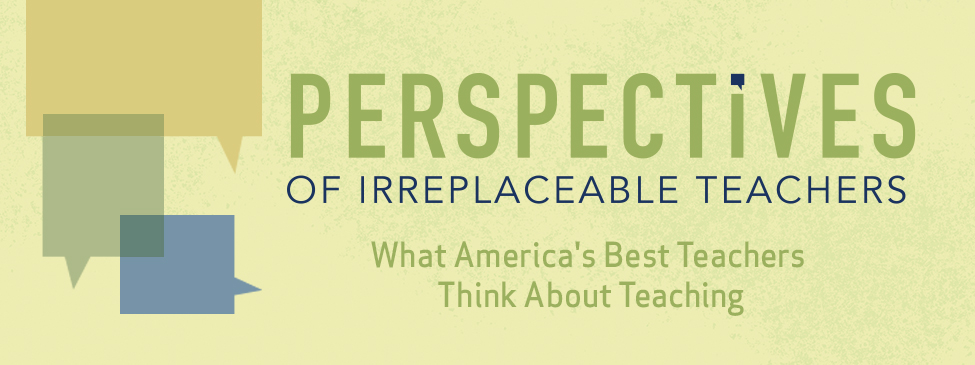At TNTP, we believe that a worthy teaching profession should be built around its most outstanding members. For our new report, Perspectives of Irreplaceable Teachers, we surveyed 117 of the nation’s best teachers, to hear their views on education policy and the teaching profession.
Today, we continue those efforts by turning this space over to Nella Garcia Urban, Managing Director – Talent Pipeline at YES Prep Public Schools, a network of high-performing charter schools in Houston that nominated some of its most outstanding teachers to participate in our survey.
Like schools almost everywhere, YES Prep has struggled with teacher burnout, which teachers in our survey mentioned time and again. The organization has taken important steps to provide teachers with professional flexibility, pay that reflects their performance and opportunities to advance without leaving the classroom behind, all of which can help keep irreplaceable teachers where they are needed most. As Garcia Urban notes in her piece, “It is all of our responsibility to work towards a solution to the unsustainability of truly excellent teaching for those currently doing that crucial work.”
TNTP recently released Perspectives of Irreplaceable Teachers and we are grateful and honored that some of our teachers were asked to participate. Reading the study, there were many survey responses that resonated and we could hear our teachers’ voices magnified by other great teachers across the country. A couple of the survey responses stumped us, though, and we’re interested to share our perspective. And in other places we feel encouraged about the work our organization is doing in making some traction towards some of the major tension points for successful teachers.
The primary sections of the study we looked at to glean insight into our own teachers was the section asking teachers for their open responses about their jobs and the survey responses about their barriers to success.
In open responses, TNTP reported that teacher burnout was a major issue that came up again and again. We appreciate that TNTP allowed for open-ended comments about their experiences as this gives such valuable insight into the differences among great talent, but more importantly, the common concerns that are so pervasive. It is all of our responsibility to work towards a solution to the unsustainability of truly excellent teaching for those currently doing that crucial work. Here are some of the representative quotes TNTP featured:
I would feel more appreciated if:
“I had pathways for teacher leadership from within the classroom and with appropriate compensation.”
“I could be paid for the results I can show and for helping guide effective policy creation and implementation at my school.”
“I did not have to constantly worry about salary and benefits.”
What I like least about teaching is:
“Almost every moment of the week, I feel that I am either sacrificing my students’ learning or my own health and personal satisfaction. I am constantly deciding to cut corners for students in order to prioritize my own life, or to prioritize my students and put my personal life second.”
“That there are only 24 hours in the day and that so few are dedicated to sleeping during the school year! If done right, teaching requires as much as you can give and this is a challenge that must be monitored to maintain a personal life.”
“The inflexibility of the schedule and the very early mornings. The inability to be able to do small things like go to the doctor’s office or even take a phone call during a regular day is difficult. Also, knowing around what I will make for my entire career no matter how much I push myself, better myself, or put in extra hours.”
This is the current truth for effective teachers right now. In order for teachers to truly be great, they have to have the attitude and drive to do whatever it takes for their students. Given this, there is some level of stress and exhaustion that we can’t remedy—if we give them more time to work, they’ll work more, if their students are lower than the year before, they’ll work harder, if given more stuff they’ll do more with it—this is why we love these teachers and why their students’ lives are immeasurably changed by then. Our charge, then, is to serve our excellent teachers in the best ways we can—appreciate them, train them, and try to solve the problems for them that are within our control to solve.
Our major effort at YES Prep for making teaching a viable, long-term option for our best teachers is through our Teacher Continuum. This is part of our teacher evaluation system that gives teachers a clear pathway for their progression and is meant to incentivize teacher retention and reward performance over time. Teaching is one of the only professions where salary is not typically tied to performance and we’re changing that. In simplest terms, if a new teacher comes in at $44,000 and is highly effective, by their third year they can be making $54,000, and by their 5th year, with excellent and consistent performance, they could be making $66,000.
We are really excited for the possibilities with our Teacher Continuum and right now it is still a work in progress. Our biggest challenges are making sure our teachers have a clear understanding of how they are evaluated and that the criteria are applied consistently across all 13 schools. Right now only 77 percent of our teachers agree that they understand how the process works and 73 percent agree that it helps them chart their own growth. Through open responses and anecdotal feedback we also know that it can be very stressful for teachers because it’s very rigorous and comprehensive and it’s not always clear how it’s applied to everyone. These are very real concerns and as we enter our third full year of using the Teacher Continuum, we’re committed to addressing these concerns. Our best teachers deserve a great salary for their great work and we want this to happen without it adding to their stress level.
The representative open responses TNTP shared also spoke to a lack of work-life balance and feelings of burn out. In an effort to create a better work-life balance for our teachers at YES Prep, we’ve incorporated one “mental health afternoon” into every six weeks of school so that teachers can schedule appointments in advance or just know they’ll be able to relax and go home in the middle of the day. On one campus we’ve also piloted a flex schedule that allows all teachers to either leave early or come in late at least once per week. Needless to say, the teachers are big fans so far. Our Talent Support team has also prioritized teacher satisfaction when determining our system-wide benefits and we’re excited that starting this year, staff automatically are eligible to take eight weeks of paid leave when they have a baby or other major medical event. Other perks include free sessions with health coaches and counselors so that our teachers have the resources to take care of themselves without the added burden of paying extra for it.
TNTP also gathered responses for the barriers to success for excellent teachers and these were at the top:
- 40% ‘Insufficient time for planning or collaboration with other teachers’
- 40% Having students who are behind academically or behaviorally challenging
- 40% Having students whose out-of-school lives distract from their focus in school
- 30% Having to work with other teachers who are not effective
The top barrier to success resonated with us and we’ve been putting concerted effort into figuring out how to strategically schedule in order to make teacher collaboration time a priority. Our teachers have always had two planning periods to balance the longer school day and more recently we’ve taken other steps:
- Planning partners have the same planning periods
- Formal systems are in place for collecting and sharing materials among content area teachers
- We have eight full days of system-wide content team time
- Campuses often have structured work time during PD to encourage collaboration
- Co-teachers often have joint conversations about their student data with their deans of instruction
- Novice teachers have monthly content-specific work time through Teaching Excellence, our novice teacher development program
The second and third barriers to success caught us off guard. Our teacher selection process includes a 45-minute interview dedicated solely to making sure a candidate has the right mindset to work at our schools and that they’re committed to the mission of serving low-income students and getting them college ready. While we haven’t surveyed our teachers specifically to see if they feel like the population we work with is a barrier, based on our culture and selection process, it’s unlikely that many of our teachers would choose these options.
Working with ineffective colleagues also ranked high on the list with 30 percent identifying it as a major barrier as well as 41 percent and 61 percent identifying it as a problem at their schools and districts, respectively, according to TNTP. While our data is not a direct match, when asked their agreement with the statement, “My colleagues are committed to doing quality work,” 90 percent of YES Prep staff agree or strongly agree and 80 percent agree or strongly agree that “YES Prep is developing high-caliber people.” We’re proud of those numbers and know that it is imperative that we continue to keep a laser focus on the quality of our incoming teachers and their development so that excellent teachers and deserving students aren’t held back by subpar teaching down the hall.
We again want to thank TNTP for sharing their findings and spotlighting the current tensions and truths that come with being an excellent teacher. While no amount of reform or salary level will change the amount of work it takes to bring a struggling student up to grade level and beyond, we definitely can change the environment that surrounds these irreplaceable educators. It’s our duty to push the conversation and give voice to the change that needs to happen and we invite others to join us in changing the landscape of education for our best teachers.
This piece originally appeared on the YES Prep blog, and was republished with permission.








